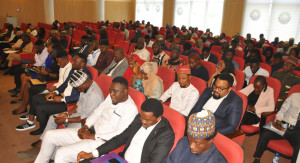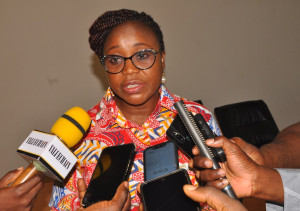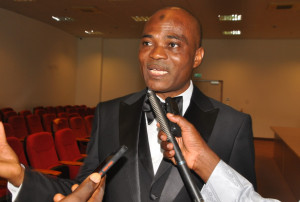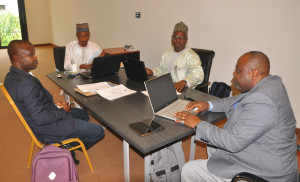The Petroleum Technology Development Fund (PTDF) has deployed a newly developed fake certificate detection technique to identify any fraudulent credentials that candidates may present during the ongoing screening process for the awarding of 2023/2024 overseas scholarship program (OSS).
 Over 5000 shortlisted candidates are currently being interviewed across the country by experts from academia and the oil and gas industry, to defend their various topics and research proposals for the award of PTDF scholarships in both the M.Sc. and Ph.D. categories for studies in the United Kingdom, Germany, France, Malaysia, and China.
Over 5000 shortlisted candidates are currently being interviewed across the country by experts from academia and the oil and gas industry, to defend their various topics and research proposals for the award of PTDF scholarships in both the M.Sc. and Ph.D. categories for studies in the United Kingdom, Germany, France, Malaysia, and China.
 Mrs. Bolanle Kehinde Agboola, Head, Overseas Scholarship Scheme (OSS) Department of the Fund, confirmed the development while briefing panelists and other stakeholders at the flag of the 2023/2024 selection exercise in Abuja, saying the fake detection mechanism is one of the Fund’s deliberate policies to improve the transparency of the scholarship scheme, which has evolved over the years.
Mrs. Bolanle Kehinde Agboola, Head, Overseas Scholarship Scheme (OSS) Department of the Fund, confirmed the development while briefing panelists and other stakeholders at the flag of the 2023/2024 selection exercise in Abuja, saying the fake detection mechanism is one of the Fund’s deliberate policies to improve the transparency of the scholarship scheme, which has evolved over the years.
She stated that the Fund had recorded instances of candidates arriving with fraudulent credentials during past exercises, which has been of concern. “As you know the OSS has evolved over the years and based on our observations in previous exercises, we discovered some candidates coming with fake credentials, because of that this year we are able to go a step further to ensure the integrity of the exercise. We have come with some equipment that will help to a large extent curb issues of fake certificates in our selection process”.
Mrs. Bolanle revealed that the machine was donated by a PTDF ex-scholar who is also a panelist in the interview selection process, adding that PTDF is always proud to deploy its scholars who have done exceptionally well in their chosen fields of endeavor to demonstrate excellence in scholarship.
 Professor Abdulkadir Mukhtar of Petroleum and Gas Engineering, Federal University of Technology (FUT) Minna, a former PTDF scholar, stated that he decided to donate the detection tools as a commitment to enhancing the process and giving back to the institution that has done so much for him.
Professor Abdulkadir Mukhtar of Petroleum and Gas Engineering, Federal University of Technology (FUT) Minna, a former PTDF scholar, stated that he decided to donate the detection tools as a commitment to enhancing the process and giving back to the institution that has done so much for him.
“One interesting thing about PTDF is that year in and year out they always bring something new, so this year an idea came to me that there is something we can do to make the exercise better. Some panelists have been complaining that they have discovered fake certificates previously. The idea behind this mechanism is that each certificate has some security features, so if you subject it to this equipment, it will bring them out, and that way you will easily discover fake ones. We just want to ensure no one is disenfranchised and also improve on the already established transparency in the process”.
 Professor Abdulkareem Nasir, Engineering Group 2 at the Abuja interview Centre said the equipment has already helped them to detect a fake certificate in the ongoing exercise. “the idea is very brilliant, and its already yielding results, today we have seen a certificate that we do not trust, and it was easy for us to ascertain. It allows you to rule out circumstances like this and provides you confidence that the certificate you’re looking at is authentic. We pass all the certificates through this test, and we are able to detect one fake certificate”.
Professor Abdulkareem Nasir, Engineering Group 2 at the Abuja interview Centre said the equipment has already helped them to detect a fake certificate in the ongoing exercise. “the idea is very brilliant, and its already yielding results, today we have seen a certificate that we do not trust, and it was easy for us to ascertain. It allows you to rule out circumstances like this and provides you confidence that the certificate you’re looking at is authentic. We pass all the certificates through this test, and we are able to detect one fake certificate”.
The interview which is the next level of screening for the award of the scholarship is being conducted simultaneously in six centers across the six(6) geopolitical zones with candidates from the North Central holding their interviews at the PTDF Tower in Abuja, South West at University of Ibadan, South-South at University of Port Harcourt, South East at the University of Nigeria Nsukka, whereas the candidates from the North West is holding at the Fund’s Centre of Petroleum and Energy Studies, Kaduna and Abubakar Tafawa Balewa University for candidates from the North East respectively.
The scholarship applications are in the areas of Engineering and Renewable Energy, Computing and Geosciences, Environmental, and Management as well as other related disciplines that are relevant to the oil and gas industry in Nigeria.

